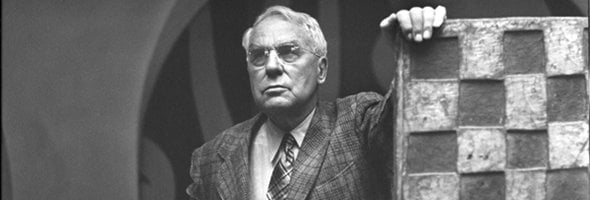As much as I love documentaries, they often leave me feeling ignorant, even though I've just learned things. It proves that I'm just a headline-reader more often than not. The Art of the Steal is a good example of this. It chronicles the ongoing battle for control of the priceless ($30 billion-ish) art collection of Albert Barnes, a story of which I knew just surface facts. More than that, it's a morality tale that covers the larger war of "passion vs. money," where legality is a curtain that can be pulled back when needed. There are bottomless depths to what people do for financial power, and in that regard, The Art of the Steal is more American than apple pie. My apple pie, not your apple pie. Albert Barnes was intelligent enough to be the right guy in the right place at the right time in acquiring a massive private cache of art that rivals and/or surpasses most public museums. In the early 1920s, he founded the Barnes Foundation, an institution developed to educate educators of art, where he displayed his entire 9000-piece collection in a moderate-sized building in the middle of a neighborhood in Lower Marion Township, a suburb of Philadelphia. Barnes took critical heat for staying put in this location and not allowing more of the public to view his possessions. Such dissenting opinions then snowball into one of the more mind-blowing examples of "gimmee gimmee" that I've ever seen.
Barnes was also smart enough to draft a wordy final will that dictated at length exactly what was to be done, and more specifically what was not to be done with his foundation and all the art inside. Never could Barnes have predicted the greed and ambition that would come to undermine his every intention, which was for his collection to remain educationally purposeful. He specifically says that nothing is to be lent out, sold, or even moved from the spots that Barnes assigned them. To cover financial costs, he left a large stipend in the bank, where interest quickly accumulated. Barnes left the foundation in capable hands, thinking ahead into the far-off future. What he foresaw doesn't quite resemble what's happened.
The Art of the Steal wastes little time in going for your interest's jugular. The hero in this tale dies early on, his legacy is the very expensive MacGuffin over which opposing sides are unnecessarily taken, and a rogue's gallery soon emerges. Publisher and art enthusiast Walter Annenberg is presented (a tad hyperbolized) as the vulture circling the foundation, ever ready to take the entire thing to the larger, more accessible Philadelphia Museum of Art. But he's the most harmless of the bunch.
The pacing never loses speed. Title cards separate the different bits, each of which is accompanied by an affecting instrumental track. The mood of the viewer is always under strict guidance, but they keep it classy. I've read others call this movie non-objective, but I give it more credit than them, because one of the biggest villains in the story is allowed his turn and he actually takes it. Also, the areas where I think the filmmakers did the most truth-hedging are in direct effect to Barnes' will being defied.
The "bad guy" I mentioned is Richard Glanton, an enterprising lawyer who beelined his way to President of the Foundation. He is the ignition without which this story would never leave the lot. Glanton's colorful tenure replaced the education purpose with a financial purpose, and no one looked back from there. A rift was drawn between the Philadelphia elite, which soon included high-end politicians, and the suburban neighborhood that housed the foundation since its inception. The neighborhood was filled with former students (soon to call themselves Friends of Barnes) who became increasingly intolerant of the constant traffic the foundation started drawing.
That's just skimming the story, really. Once everything becomes about money, I know facts will be skewed, but how hard it is for people to understand that not everything is supposed to BE about money? If I was an enormous Prince fan who desperately wanted to hear the 10 billion (est.) songs he's got vaulted up, and was denied, I wouldn't suddenly think it correct for me to manipulate legal documents in order to force him to make the songs public domain. (It was a different analogy originally.) It's his shit, and it's not mine to see freely if he doesn't want me to. I'm not an art snubber, but millions of people can kiss grits if the thing they want is forbidden by a binding contract. The paintings were nice, yeah, but I'm more interested in how much money was wasted trying to make money off of them.
The story works well enough on its own, but there are quite a few interesting people showcased through interviews. John Anderson, author of Art Held Hostage: The Story of the Barnes Collection, sparks laughter every time he's on screen, because intelligence is funny. Attorney, and Friend of Barnes, Nick Tinari is equally scathing and hilarious with his time. You can disagree with them, but you can't say their beliefs are passive. The same can be said of Richard Glanton, whose presence adds the bit of subjectivity needed to give voice to the other side. He made a lot of money, so he definitely believes what he did was the right thing. Was it the best thing? You decide.
If you live outside Philly and don't already have an opinion based on everything involved, you'd be doing yourself a favor in checking The Art of the Steal out. It's art for smart's sake. Just remember, if it looks like a museum and smells like a museum, it might just be a school, and should stay a school if it was meant to be that way. There was a lot of awesome footage taken over a multi-year span about this story. I would have liked some footage of the exhibits or even a photo gallery. Instead there's just the good documentary. Score.

Nick is a Cajun Country native and an Assistant Managing Editor with a focus on TV and features. His humble origin story with CinemaBlend began all the way back in the pre-streaming era, circa 2009, as a freelancing DVD reviewer and TV recapper. Nick leapfrogged over to the small screen to cover more and more television news and interviews, eventually taking over the section for the current era and covering topics like Yellowstone, The Walking Dead and horror. Born in Louisiana and currently living in Texas — Who Dat Nation over America’s Team all day, all night — Nick spent several years in the hospitality industry, and also worked as a 911 operator. If you ever happened to hear his music or read his comics/short stories, you have his sympathy.
Viral Video Shows Florence Pugh Trying To Get Pedro Pascal's Attention At Thunderbolts* Premiere, And It's Such A Mood
Stranger Things’ Joe Keery Shares Feelings On Possibility Of Fans Only Recognizing Him As Steve For Years To Come, And I Love This Take
'That's The Official Word': What The Cast Of Ted Lasso Has Said About Season 4











